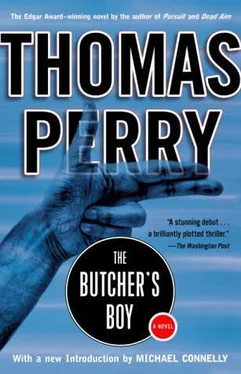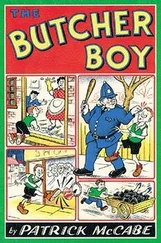“I finished early.”
Orloff’s face seemed to bloat suddenly with suppressed anger. At that moment a waitress appeared with a jug of coffee, which she poured with cool precision in a stream from the height of about a foot. When she disappeared Orloff pronounced with malicious triumph, “You’ve made a serious mistake.” Then he shook his head, making his jowls wobble. “It was not discreet. Not discreet at all.”
“Don’t worry,” he answered. “They don’t give a shit about you. They just wondered if I was here working, and I’ve taken care of that.” He took a sip of his coffee, which he decided was rather good. It was a shame Orloff was here to distract him. He was getting hungry.
“Oh, I’m sure you have,” Orloff sighed. “You show up three days early looking like that and then give me your assurances that everything’s fine. You’ll pardon me if I don’t bubble over with confidence in your judgment.”
“Sure. I’m not your psychiatrist.”
Orloff almost smiled. “The condition of your face would indicate you’ve miscalculated before.”
“If you’re worried about it pay me now and I’ll go away.”
“It’s not that simple,” said Orloff, his hands beginning to flutter about in his suit coat again before he located his handkerchief and mopped his brow. “It’s a sizable sum and it isn’t here yet. Which, if you had lived up to our agreement, would have been here at the moment you arrived.”
“Don’t start talking breach of contract,” he said. “You may be a terrific lawyer, but save it for a court. Nobody refuses to pay me.”
“You’ve made it much more difficult. How do you imagine it’ll look to them when a large sum is passed from us to you? It’s much more difficult.” He shifted his eyes to his coffee cup, staring at it as though he were surprised to see it. “Much more difficult, more difficult and more expensive.”
“You’ll get it. Nobody refuses to pay me,” he smiled.
Orloff cocked his head and stared at him. “No,” he said. “I suppose they don’t.” He pushed his coffee away as though afraid he would spill it, then ascended to his feet like a freed balloon. “Friday,” he said. He rushed back up the aisle, glancing at his watch.
He watched the fat man out the door, then went to the serving area to select some food. It was too stupid even to think about, he told himself. Orloff was afraid because he knew they would see the connection as soon as the money came out. But the first thing Orloff had done was walk right up and sit down with him in a public place where they were sure to be seen. What was that for? Maybe to prove to someone he wasn’t afraid. Afraid of what?
None of the old men should care about it one way or another. It was a straightforward set of contracts between outsiders on outsiders. He carefully picked out fresh vegetables from the platter with a pair of silver tongs. Maybe it had something to do with the money: he’d said there was trouble getting it together. But they always said that, the lightweights and small timers—as if they were afraid he’d want more if they didn’t pretend that was the last dime. Still, it didn’t make any sense. Orloff was genuinely worried about something.
He moved along the serving line, picking small portions of food that looked as though they’d be good for him. By the time he had returned to his table he had worked enough of it out. There was a third party involved in it somewhere, a third party Orloff was afraid of. And if Orloff was more afraid of the third party than he was of him, he guessed maybe he’d better start worrying a little bit too.
ELIZABETH TRIED TO CONSOLE herself as she struggled to get the airplane seat to lean back at the proper angle. There wasn’t much material to work with, but she tried. She’d been away long enough already, for one thing. It would be nice to sleep in her own bed and not have to worry that she was running out of ways to recombine the few outfits she’d had time to throw into the suitcase. She looked at the profile of Hart in the seat beside her: of course, his time was up too. The FBI had jerked him back to Washington as they’d said they would. Wednesday was the limit. It didn’t matter that the two of them had spent most of the time shuttling from disaster to disaster like a pair of reporters, always just a few hours too late to do anything but visit the spot where something was supposed to have happened. And there would be lots of work waiting for her when she got back to the office; Brayer had made that clear. It might not be work that made any difference, but somebody had to do it no matter what, and she was drawing the salary so it would be she. Elizabeth watched the stewardess making still another circuit of the cabin with her tray of drinks, offering each passenger one more chance whether he or she showed any interest or not, awake or asleep, alive or dead for all Elizabeth knew. Every station had to be treated with exactly the same leisurely solicitude, even if the stewardess knew the next five didn’t want to be bothered and the sixth was waving a twenty with one hand and an empty glass with the other. Standard procedures had to be followed and there was always a logical reason for them that had to do with statistics. Organizations did things with the long run in mind. It was only individuals that jumped at momentary advantages, took short-cuts, made mistakes. Then Hart was talking to her.
“It’s not as bad as all that,” he was saying. “You look pretty depressed for somebody who’s going home.”
“It is as bad as all that,” said Elizabeth. “I could tell we were getting closer to it. I could feel it. And now we’ll go back and the whole thing will be buried in the files.”
“Sure,” he said.
“What do you mean?” said Elizabeth. “Is it as simple as that? No results because they didn’t feel like letting us do a real investigation? That’s great.”
“I mean that we did what we were supposed to do—we looked around and got some information on two different matters, and it’ll go into the files and maybe contribute to the handling of those matters. That’s what it’s all about.”
“Matters?” said Elizabeth. “Jesus.”
“You can’t think in terms of solving these problems yourself. What you do is contribute to a systematic information-gathering effort, and you’d better realize that or you’ll find yourself being unhappy and frustrated most of the time. Maybe a decent dinner would cheer you up. We’ll be in Washington at five thirty and I could pick you up at eight. I might have enough clout to get us a late reservation at Le Provençal or Sans Souci on a Wednesday. I’ve always made a point of grossly overtipping just in case of an emergency like this.”
She smiled as kindly as she could. “No thanks,” she said. “I’m tired and I want to see what I can do tonight about the way I look before I stagger back to work in the morning.”
He didn’t seem daunted. There was something to be said for men who didn’t seem daunted, she decided, but it wasn’t enough to change anything. She listened as he tried to make his way back to neutral ground as gracefully as he could: “It’s a solitary hamburger for each of us then,” he grinned. “Some other time.”
“Some other time,” she agreed. But would there be another time, she wondered. There was a mystery to these things too. Sometimes something happened and sometimes nothing happened. Whatever controlled it was too subtle and indistinct to make rules about. She settled back in the seat and watched the approaching stewardess. There was no reason not to have a drink, she thought. She wasn’t going anywhere.
15
Thursday morning. He stared into the mirror and worked his fingertips over the skin of his cheeks. It wasn’t too bad. He was still young enough to heal quickly, he thought. In another day or two the suntan and the soft life would take care of the worst of it, and he was beginning to think there might not be a scar. He lingered in the shower for fifteen minutes, trying to decide how to manage the next stage of it. There was too much he didn’t know. He dressed carefully and inspected the results. Not bad—a real estate man from Phoenix having a little side trip on the way home from a business meeting or a winter vacation, if it weren’t for the bruises. But the sunglasses helped.
Читать дальше












